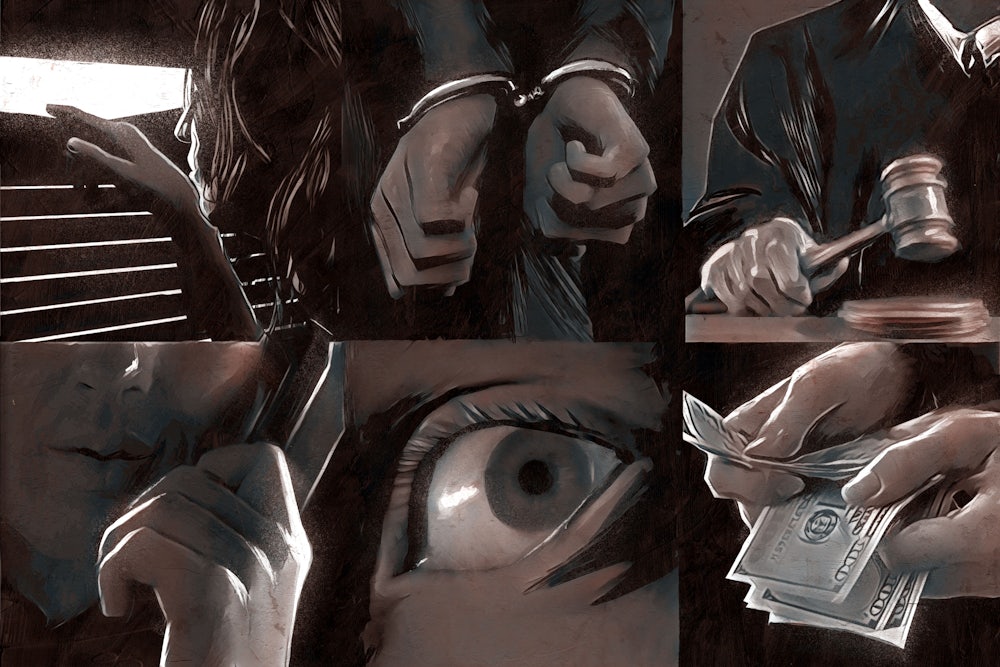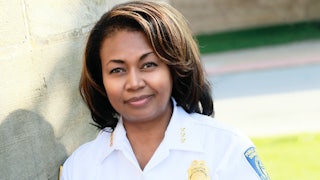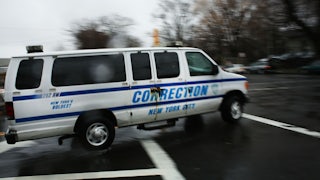On January 27, 2017, the Houston chapter of Crime Stoppers held a ribbon-cutting ceremony unveiling its new headquarters. Local dignitaries, including the lieutenant governor of Texas, gave speeches to mark the “historic” occasion, as CEO Rania Mankarious described it. A young woman belted out the national anthem. A crowd of 250 clapped and cheered.
The building, which looks more like a slick big-city condo than the headquarters of a nonprofit, is named after Dave Ward, a local TV personality who founded Crime Stoppers of Houston in 1980. Ward looks exactly like the retired news anchor that he is, with sharp blue eyes and distinguished gray hair. Starting in the 1980s, he aired segments on unsolved crimes, dramatized by acting students, and called on his audience to share tips with Crime Stoppers. Ward was the final speaker that January day, and he didn’t disappoint, reprising his old nightly act: “Five-thousand-dollar cash reward this week for information leading to the arrest and charging of the … asshole who committed this felony!”
Crime Stoppers has 20,000 chapters across the United States, from California to New York, which take in anonymous crime tips and turn them over to police. If the tip leads to an arrest, the caller gets a cash prize. Billing itself as “a partnership between the Community, the Media, and Law Enforcement,” the nonprofit network has for decades been a staple part of American policing and an unquestioned element of the culture that encourages citizens to have constant vigilance for potential crimes. In an era of police reform, however, Crime Stoppers’ role in shaping policy and public perception on criminal justice has received little scrutiny.
A perusal of the Houston chapter’s financials explains the slick new headquarters. The chapter posts revenue of almost $2 million and nets millions in donations each year. Some of the city’s wealthiest people sit on the board. Crime Stoppers of Houston claims to have helped solve 35,767 cases since 1980, with 374 in 2020 alone, leading to 238 arrests and payments to 248 tipsters totaling $310,800. It says its work has led to $299,131 in seized and recovered “property and drugs” this year (which, given asset forfeiture laws in Texas, likely ended up with the Houston Police Department). Additionally, this September, District Attorney Kim Ogg gave the chapter a $500,000 check from what she called “dirty money.”
“This is the people’s money,” Ogg said. “It was taken from criminals, from their proceeds, it was forfeited through a lawful process, and it’s being reinvested into the public safety of our community thanks to Crime Stoppers.”
The story of Crime Stoppers’ funding, however, is not quite that simple. In fact, Texas law dictates that felony defendants pay a $50 fee that goes to Crime Stoppers as a condition of their parole, even if the organization had nothing to do with the reason they went to prison. Failure to pay that fine can send them right back to jail. Texas is not alone in this. At least seven other states charge defendants a fee that goes to their local Crime Stoppers: Louisiana, New York, Florida, Mississippi, Kentucky, and Indiana. Texas also has a statute empowering a judge to order a defendant to “pay a fine repaying all or part of a reward paid by a crime stoppers organization,” though no local lawyers I spoke to could recall a case where they had seen that happen.
The blanket fees applied to parolees may appear minimal, but for some, even an extra $50 can be punishing. In the winter of 2020, Justin Henderson, 35, found himself in a different stately building in Houston. The Harris County jail is outfitted with windows that don’t open or let in light, but the fakes help the building blend in with the skyline. Four years ago, Henderson was apprehended for evading a police officer, but the judge in the case decided he was a safe bet for community supervision rather than prison. Henderson had to find work, take alcohol and drug tests, and allow case workers to come see him anytime and anywhere, among other requirements. In 2019, he was arrested for failing to procure a breathalyzer test, although he claimed he had gotten one but that the machine had been faulty. He asked the court for release. “I have four beautiful children and three stepchildren that need me,” he wrote. “I ask you to please allow me forgiveness and consider probation.”
Henderson was let out. But last December, he was arrested because he’d broken the conditions of his release again. He’d failed to complete a class called “Effective Decision Making” and had gotten behind on his court fees, totaling $260. Part of that was the $50 he owed to Crime Stoppers of Houston. (It seems unlikely, given the nature of his arrest, that a Crime Stoppers tip was involved. The chapter did not respond to questions.)
Alex Bunin, a Houston-based public defender, told me it is usually a combination of factors that send people back to jail. “The cumulative effect of technical violations … it happens often,” he said. An academic study published in Corrections: Policy, Practice and Research describes a feedback loop where “one’s status as being under correctional supervision at release from prison leads to increased debt, which in turn increases the chance of remaining under supervision during the first year out.”
A judge put Henderson’s bond at $7,500, and he spent the holidays behind bars. On February 4, Henderson’s fellow inmates tried to alert the authorities that he was making strange noises; soon he became unresponsive. Eventually, firefighters arrived and determined that he needed to be sent to a nearby hospital. “At 1:39 am Dr. M. Shin pronounced death,” the curt official summary concluded. According to the custodial death report, he died of an accidental heroin overdose. A spokesperson for the Harris County facility could not say if Narcan, the opioid overdose reversal drug, was administered by jail staff, and did not reply to other questions about Henderson’s death.
Crime Stoppers, founded in 1976 by an Albuquerque, New Mexico, detective named Greg MacAleese, seems like a relic of a bygone era when cops were almost always “the good guys.” In the media of the 1980s, 1990s, and early 2000s, TV detectives were flawed but noble; the prosecutors on Law and Order were always on the side of right and deeply compassionate; the violent show Cops was celebrated by critics and embraced by audiences. And America’s Most Wanted demanded viewers perform their civic duty by helping law enforcement with tips, after melodramatic depictions of crimes, much as Dave Ward did in Houston.
Today, the term copaganda proliferates on social media. Cops was canceled (as in, taken off air) last summer, after the police murder of George Floyd. Progressive prosecutors like Chesa Boudin and Larry Krasner have become high-profile symbols for criminal justice reform. Videos of white people wrongly calling the police on Black people have become a viral phenomenon.
Like Citizen App, or Nextdoor, which have been criticized for promoting a vigilante mentality and racial profiling, Crime Stoppers relies on a model that encourages people to call the cops early and often: the polar opposite of anti-incarceration thinking. And it attaches a large cash reward for tips that lead to an arrest—not necessarily a conviction—drawn from funds partly made up of fees collected from defendants like Henderson.
The prospect of a cash reward in return for completely anonymous information seems ripe for abuse. “What happens if I’m mad at an ex-boyfriend and submit a fake tip?” I asked Chris Cameron, a chairperson with Crime Stoppers’ national organization. She said that they do get prank tips and other useless information, but they let police sort it out. “We just send them everything,” she said.
Cameron emphasized that an anonymous tip can’t be the sole basis for a search warrant, but Scott Hechinger, a Brooklyn-based attorney, said that while it is true that there’s technically a high bar for anonymous tips to lead to an actionable police response, those standards aren’t always met. “There are supposed to be very high requirements to justify police action based on them. But yes, they are used a bunch,” he told me. He pointed to an especially egregious case where New York City police officers arrested three men after receiving confidential tips that they had guns. The men spent a year awaiting trial, before it was ultimately revealed that police not only planted the guns but possibly submitted the tips.
Cameron also made the case for Crime Stoppers by noting that a tip that goes directly to cops can’t really be 100 percent anonymous, because it can be used in discovery or subpoenaed. “I have calls where people are whispering, they’re scared their neighbors will overhear,” she said. She told me she thinks of it as a form of justice for victims of crimes: “They should be heard, not silenced.”
That sentiment is what led MacAleese to start Crime Stoppers. The young detective was frustrated by a lack of leads in the homicide of a young man, so he reached out to the public. “A reenactment of the crime aired on September 8, 1976,” he told me, when I reached him in the Philippines, where he now lives, via Facebook. “We solved the case one day after [it] aired.” MacAleese seems proud of his legacy. “Thank you so much. Keep up the good work,” he posted to Facebook in response to a gif celebrating the forty-fifth anniversary of the organization in September. Ironically, also on his Facebook page, MacAleese shared a Fox News story about Bill Maher blasting “snitch nation,” in which “everyone is an amateur policeman” and “tattling is a virtue.” “Your thoughts?” MacAleese wrote.
Obviously, sharing information about a serious, violent crime, like the shooting of the student that first motivated MacAleese, isn’t petty tattling, but Crime Stoppers solicits tips on a wide range of potential criminality. When I asked Cameron what kinds of offenses are reported most often, she did not cite murder or rape. “Off the top of my head, I’m thinking it’s drugs. And guns. And anything that comes with drug dealing,” Cameron said. The first category on the tip form for Crime Stoppers of Houston is “School related and bullying,” and it asks a series of questions like the grade, date, description, and a list of everyone involved. In the “Drugs” section, the first question is: “Does the suspect sell or use drugs? Or both?”
The national group’s outreach, too, belies the idea that the focus is just on violent crimes. Three instructional videos on the national site demonstrate what happens if you call in a tip; in each, the same middle-aged man answers the phone, while the voices of the “callers” are obscured. At the end of the video, the true identity of the actor playing the caller is revealed. In the first one, what sounds like a white woman turns out to be a middle-aged Black man; in the second, an “Australian man” turns out to be a young woman. The point is to convince the public that their identity will be fully obscured and no one will know that they reported their neighbors. But the videos are also telling for the kind of crime they encourage people to report.
“This is a nice neighborhood!” the “white woman” whines after reporting a suspected drug deal. The “Australian man” reports his roommate for “nabbing,” presumably stealing small items. In the final video, a “male barfly” reports overhearing another man talk about how he’s evading the police. The crime is unclear, but presumably it’s serious. Yet when the “male barfly” is revealed to be an attractive young woman, she turns to the suspected criminal and flirtatiously says, “Howdy”—surely not a great idea if you’re engaging with a dangerous fugitive.
The Crime Stoppers concept may seem outdated, especially regarding drug use. But the Houston chapter is very much on top of recent developments. Both Mankarious, the CEO, and Andy Kahan, director of victim services and advocacy, run powerful P.R., not only for the organization but for laws and policies, including vehement opposition to cash bail reform.
Bunin, the Texas public defender, takes issue with the Crime Stoppers fees being levied on defendants, but what really rankles him about the group is its advocacy against changes to the criminal justice system that would help his clients. He noted that Crime Stoppers is deeply enmeshed with elected officials, pointing out that Ogg, the district attorney who handed over the big check, used to head the program. And while the group has been a thorn for years, “lately they’ve been very politically active,” Bunin says. “Bail reform brought them in.”
In January, Kahan joined a Harris County commissioner for a town hall on “skyrocketing crime,” during which he railed against looser bail restrictions. “We have no clue as to how many defendants who have been released on felony bond have been charged with additional crimes. I would think we would want to know that,” he said.
Perhaps Crime Stoppers is of its time, after all. After a wave of protests and calls for criminal justice reform and alternatives to policing, there’s been a national backlash prompted by a spike in homicides. Many leading voices in that backlash have pointed to calls to defund the police and reforms like the end to cash bail as the culprits. But experts caution that it’s far too early to draw conclusions about the cause and that homicide rates have stopped growing as the pandemic wanes.
“They claim the crime rate has gone up, when it hasn’t,” Bunin says. “And law enforcement and district attorneys like that message. In return, these folks are promoting Crime Stoppers, showing up, speaking on their behalf. These things give them legitimacy, and that brings money in the door for Crime Stoppers.”
This article is supported by the Economic Hardship Reporting Project.






